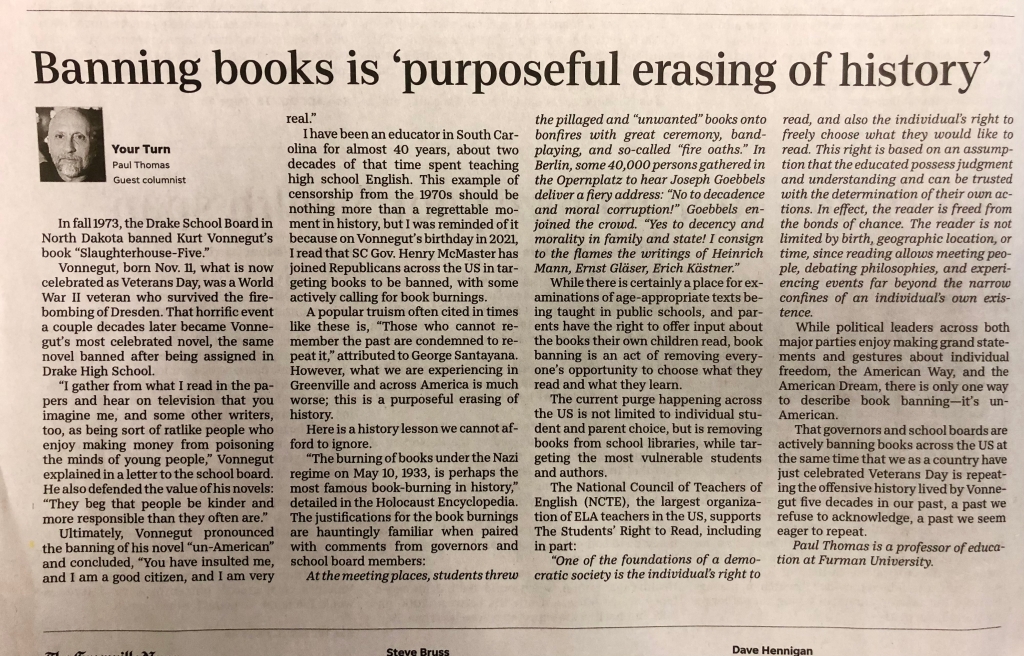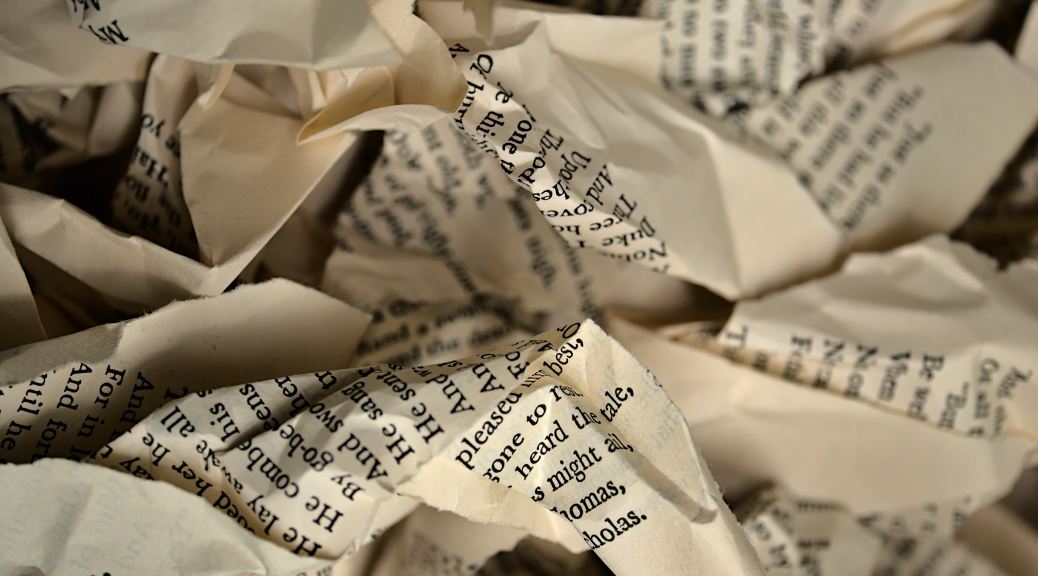[Update: Published at the Greenville News (SC); see PDF at end of post with hyperlinks]

In the fall of 1973, the Drake School Board in North Dakota banned Kurt Vonnegut’s Slaughterhouse-Five.
Vonnegut, born November 11, what is now celebrated as Veterans Day, was a World War II veteran who survived the firebombing of Dresden. That horrific event a couple decades later became Vonnegut’s most celebrated novel, the same novel banned after being assigned in Drake High School.
“I gather from what I read in the papers and hear on television that you imagine me, and some other writers, too, as being sort of ratlike people who enjoy making money from poisoning the minds of young people,” Vonnegut explained in a letter to the school board. There he also defended the value of his novels: “They beg that people be kinder and more responsible than they often are.”
Ultimately, Vonnegut pronounced the banning of his novel “un-American” and concluded, “you have insulted me, and I am a good citizen, and I am very real.”
I have been an educator in South Carolina for almost 40 years, about two decades of that time spent teaching high school English. This example of censorship from the 1970s should be nothing more than a regrettable moment in history, but I was reminded of it because on Vonnegut’s birthday in 2021 I read that SC Governor Henry McMaster has joined Republicans across the U.S. who are not only banning books, but actively calling for book burnings.
A popular truism often cited in times like these is “Those who cannot remember the past are condemned to repeat it,” attributed to George Santayana. However, what we are experiencing in Greenville, SC and across America is much worse; this is a purposeful erasing of history.
Here is a history lesson we cannot afford to ignore.
“The burning of books under the Nazi regime on May 10, 1933, is perhaps the most famous book burning in history,” detailed at the Holocaust Encyclopedia. The justifications for the book burnings are hauntingly familiar when paired with comments from governors and school board members:
At the meeting places, students threw the pillaged and “unwanted” books onto bonfires with great ceremony, band-playing, and so-called “fire oaths.” In Berlin, some 40,000 persons gathered in the Opernplatz to hear Joseph Goebbels deliver a fiery address: “No to decadence and moral corruption!” Goebbels enjoined the crowd. “Yes to decency and morality in family and state! I consign to the flames the writings of Heinrich Mann, Ernst Gläser, Erich Kästner.”
Holocaust Encyclopedia
While there is certainly a place for examinations of age-appropriate texts being taught in public schools, and parents have the right to offer input about the books their own children read, book banning is an act of removing everyone’s opportunity to choose what they read and what they learn.
The current purge happening across the U.S. is not limited to individual student and parent choice, but banning books from school libraries, while targeting the most vulnerable students and authors.
The National Council of Teachers of English (NCTE), the largest organization of ELA teachers in the U.S., supports The Students’ Right to Read, including in part:
One of the foundations of a democratic society is the individual’s right to read, and also the individual’s right to freely choose what they would like to read. This right is based on an assumption that the educated possess judgment and understanding and can be trusted with the determination of their own actions. In effect, the reader is freed from the bonds of chance. The reader is not limited by birth, geographic location, or time, since reading allows meeting people, debating philosophies, and experiencing events far beyond the narrow confines of an individual’s own existence.
The Students’ Right to Read (NCTE, 2018)
While political leaders across both major parties enjoy making grand statements and gestures about individual freedom, the American Way, and the American Dream, there is only one way to describe book banning—un-American.
That governors and school boards are actively banning books across the U.S. at the same time that we as a country were celebrating Veterans Day is repeating the offensive history lived by Vonnegut five decades in our past, a past we refuse to acknowledge, a past we seem eager to repeat.


